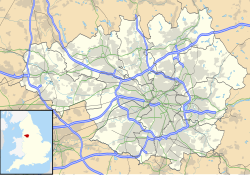History
The hall probably dates from the early to mid-17th century, [1] reflecting the vernacular architecture of the period. It was historically associated with the rural hamlet of Dearnley, which formed part of the ancient township of Wuerdle and Wardle in the historic county of Lancashire. [2]
The hall first appears on historic maps in 1851, accompanied by several outbuildings which were subsequently demolished. [3]
On 2 January 1967, Dearnley Old Hall was designated a Grade II* listed building. [4]
The hall remains a private residence. It has been adapted over time, including 19th-century additions and modern refurbishments, but retains its historic character. The property sits within landscaped gardens and has been subject to archaeological evaluation during recent planning applications. [3]
Architecture
Dearnley Old Hall is constructed of rendered stone with a graduated stone slate roof. The building follows a three-unit, two-storey plan, with a 19th-century parallel range added to the rear. [4]
The exterior features a projecting plinth and paired entrance doors set within chamfered surrounds beneath flat-arched lintels. The windows are notable for their double-chamfered mullions, arranged in groups of four, five, or six lights, with hood moulds that extend over the doorways. The gables are coped with kneelers, and the roofline includes brick-rebuilt ridge and gable chimney stacks. [1]
Interior
Internally, the hall retains significant historic features such as a timber-framed crosswall at the lower end of the house-part, three Tudor-arched doorways, chamfered beams, and a boxed-in bressummer beam, indicative of medieval building traditions persisting into the 17th century. [4]
This page is based on this
Wikipedia article Text is available under the
CC BY-SA 4.0 license; additional terms may apply.
Images, videos and audio are available under their respective licenses.




